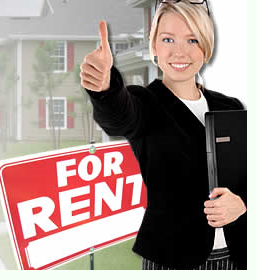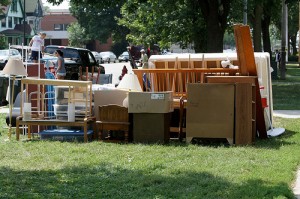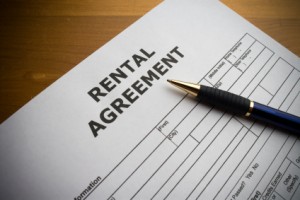Posted by Teresa on April 16, 2010 under Landlord and Tenant FAQs, Landlord Tips, Rents and Deposits | 
 Ask ten landlords about rent due dates and last charges, and you’ll probably get ten different answers—none of them wrong. The thing about running a rental property business is that you get to establish your own procedures and practices to suit your needs—within the limits of federal, state, and local laws, of course. And if they don’t work for you, you can always change them (your procedures, not the law)!
Ask ten landlords about rent due dates and last charges, and you’ll probably get ten different answers—none of them wrong. The thing about running a rental property business is that you get to establish your own procedures and practices to suit your needs—within the limits of federal, state, and local laws, of course. And if they don’t work for you, you can always change them (your procedures, not the law)!
Here we present the results of an informal survey we conducted among four landlords we know:
Landlord #1: This landlord is a stickler for rules. Rent is due on the 1st of the month. It’s late on the 2nd, which is when he posts his pay or quit notice. He doesn’t mess around—and he has excellent cash flow numbers to back up his policy. “A grace period means rent isn’t due until the grace period is over,” he says. Using an online rent payment system helps—all of his tenants arrange to pay their rent online on the 1st of each month.
Landlord #2: Rent is due on the 1st, and a 10% late fee is tacked on the 4th. Each day after, $10 more is added to the late fees. The eviction notice, however, is posted on the door on the 3rd of the month—to encourage payment.
Landlord #3: With many older tenants who depend on Social Security and Section 8, this landlord knows that rent due on the 1st doesn’t work. So, while rent is due on the 1st, there is a grace period until 5 p.m. on the 4th. On the 5th, the 3-day eviction notice is posted; if rent is paid during that time, the landlord adds a $50 late fee.
Landlord #4: This landlord wins the “flexibility” award. Rent due dates are negotiated with each tenant during the lease signing, depending on when the tenant can pay each month. Some have Social Security arriving on the 8th of the month, so that is when their rent is due. Others are paid on the 1st and 15th of the month, so the rent is due on the 2nd. Still others want to pay out of the second paycheck, so theirs is due on the 16th. All of these due dates would cause some landlords to pull their hair out—but this woman says when it comes to money that is owed to her, she can easily keep track of it.
The most important advice these landlords give is to check your local laws—you may not be able to charge a late fee at all, and many states will dictate when you may post an eviction notice.
Posted by Teresa on April 10, 2010 under Housing Trends, Landlord and Tenant FAQs, Landlord Tips | 
 In 2007, the U.S. Census Bureau reported 62% of U.S. households used the Internet in their home. That’s an enormous increase from 18% in 1997, the first year Internet use was tracked. 82% of those users reported having high-speed access, and 17% reported use of a dial-up connection. By October, 2009, some reports stated that Internet-using households in the U.S. increased to 69%.
In 2007, the U.S. Census Bureau reported 62% of U.S. households used the Internet in their home. That’s an enormous increase from 18% in 1997, the first year Internet use was tracked. 82% of those users reported having high-speed access, and 17% reported use of a dial-up connection. By October, 2009, some reports stated that Internet-using households in the U.S. increased to 69%.
It’s clear that the majority of American households use the Internet. And, the majority of those users have high-speed access. Demand has been overwhelmingly established. The only question is who pays for it?
Free Internet service is a common tenant perk. In some areas, it’s a given that a rental condo or apartment will come with free Internet—even though it might be bundled into the rent. In other markets, tenants are expected to pay for all of their utilities themselves—including Internet service.
And even though the first quarter apartment rent report showed promising results in some markets, things are still tough in the rental property business. Plenty of competition means owners continue to create incentives to attract good tenants. Is providing Internet service a good move?
Look at your market. Survey Craigslist.org and other online listing services for rental housing offers in your category. If the majority of single-family rentals do not brag about free Internet, you might need to provide it in yours. But, if you own an apartment building near your local college campus, and everyone else in the For Rent category is offering free Internet, you might have just found the reason your rentals are not filling up fast enough.
Check with your local Internet service provider about the cost of wireless service. Modem leases and monthly charges vary. Ask about security, too—especially if you have a duplex or multi-family housing situation. You don’t want a situation where tenants are vulnerable to stolen information—and you don’t want to provide free Internet to the entire neighborhood! Your ISP should be able to set up a secure system for your rental units quickly.
Whether you pass the cost along to your tenants or not probably depends on the cost, right? Still, hearing “free Internet” might be the tipping point that makes a potential tenant a year-long lease-signing tenant. And if you’re in need of some more of those, you might want to at least consider providing free Internet.
Posted by Teresa on March 12, 2010 under Landlord and Tenant FAQs, Landlord Tips | 
 Not every landlord or property management company requires tenants to hold renter’s insurance policies. And according to some reports, the majority of tenants do not have renter’s insurance. What are the advantages to requiring tenant insurance? Are there any disadvantages?
Not every landlord or property management company requires tenants to hold renter’s insurance policies. And according to some reports, the majority of tenants do not have renter’s insurance. What are the advantages to requiring tenant insurance? Are there any disadvantages?
First, the cost for renter’s policies is solely borne by the tenant, and is only $15-$20 per month, on average. So, while there are those tenants who cannot afford it, are they the best fit for your rental properties? An insurance requirement automatically screens out the potential tenants who have financial difficulties.
What’s in it for the tenant? Just as homeowners who have property insurance to protect against loss due to fire, injury or natural disaster, tenants with insurance enjoy a level of protection and peace of mind that is well worth the investment. In the event of a fire, for example, replacement property can easily be obtained, helping the tenant begin again with necessities like furniture and clothing. Some policies offer temporary housing coverage, so the tenant can stay in a hotel worry-free.
Now, let’s imagine that the fire in this example was caused by the tenant’s negligence. Without insurance, the tenant would be responsible for reimbursing the landlord’s insurance company for any damages caused by the fire—which could be tens of thousands of dollars. With renter’s insurance, the tenant and landlord are both covered.
What’s in it for the landlord? Certainly, landlords who require tenants to carry insurance will have fewer hassles in the event of a disaster. Tenant insurance also adds a layer of protection when a visitor is injured in a tenant’s unit, for example. That visitor will likely seek damages from the tenant’s policy, rather than the landlord’s. If an uninsured tenant’s negligence results in major damage (like a flood or fire) to a multi-unit building, the landlord would be liable for all damages to the structure as well as other tenant’s injuries or losses.
Rental property owners—there are many advantages of requiring tenants to hold renter’s insurance—with more than just minimum coverage. Think about the potential for large losses due to the tenant’s negligence, and have your insurance agent advise on the minimum. Just make sure to require the same for all tenants. Together, the owner’s and tenant’s policies offer both parties a broader range of protection.
Posted by Teresa on March 9, 2010 under Landlord and Tenant FAQs | 
 More than 300,000 homes have received foreclosure notices in each of the last several months in the U.S., including plenty of rental properties whose owners cannot meet their loan obligations.
More than 300,000 homes have received foreclosure notices in each of the last several months in the U.S., including plenty of rental properties whose owners cannot meet their loan obligations.
What happens to tenants when the home they are renting is foreclosed upon?
According to the Protecting Tenants at Foreclosure Act, whoever takes title to a property under foreclosure must protect the rights of tenants. Tenants with a lease are allowed to stay to the end of the lease term, unless the property is sold to a buyer who intends to make the home a primary residence. In that case, the tenants must receive a 90-day termination notice. The same 90-day termination notice is required if there is no lease in place.
And how do you satisfy a tenant who demands proof that your property is safe from foreclosure?
Tenants who bring up foreclosure concerns may have been affected in the past, are worried about losing their security deposit, or have heard about rental properties being foreclosed upon. Landlords can reassure tenants that their property is safe from foreclosure, and inform them of their rights. Reassure tenants that their security deposit is safe, and let them know if it is held in a separate account, as is the law in many states.
However, your responsibility as a rental property owner most likely ends there, with no obligation to prove to your tenants that you pay your mortgage on time. Your financial records can remain private, no matter what a tenant may demand. To make tenants feel more comfortable, consider including language from the Protecting Tenants at Foreclosure Act in your lease.
Pre-screen all tenants as part of your standard application process. Background and credit checks will help ensure you rent to qualified tenants. For more landlord resources, including forms and information on tenant screening, turn to E-Renter.com.
Posted by Teresa on March 5, 2010 under Landlord and Tenant FAQs, Tenant Screening & Background Checks | 
 Verifying a tenant’s employment history and income is a vital step to approving his or her application. The unfortunate economic situation makes it even more important; while many good people have lost their jobs through no fault of their own, your tenants still need to pass your litmus tests, including meeting minimum income requirements.
Verifying a tenant’s employment history and income is a vital step to approving his or her application. The unfortunate economic situation makes it even more important; while many good people have lost their jobs through no fault of their own, your tenants still need to pass your litmus tests, including meeting minimum income requirements.
Here are five reasons to verify employment and income on potential tenants:
1. Because landlords and property managers must know that each tenant who signs a lease agreement can live up to its terms—including paying the security deposit and upfront fees, plus the rent in full each month. Whether the tenant will pay on time each month is certainly not guaranteed—but you need to know whether they even have the capability before you sign a lease.
2. Because even if the tenant has the upfront fees ready to hand over, you’ll want to know if their employment history is solid. Holding a job is no guarantee that a tenant will pay rent on time, but it helps!
3. Because verifying the source of a tenant’s income is a great way to prevent those engaging in illegal activities from becoming your problem. In other words, if a tenant has plenty of cash but no job, be suspicious. Same for obvious high spending with a low income. It is not discriminatory to ask a tenant to prove how much money they make. Remember: pay stubs are your friends.
4. Because tenants sometimes go to great lengths to pull a fast one on a landlord. Just because they say they’re working for Jones Construction Company doesn’t mean they do. Ask for proof. Call the supervisor—and make sure that when you do, you’re actually speaking to the supervisor, not a friend pretending to be one.
5. Because knowing that your new tenant is stable and can afford the rent is one less worry for you. And landlords and property managers need to reduce worries as much as possible!
Posted by Teresa on March 2, 2010 under Landlord and Tenant FAQs, Rents and Deposits | 
 While some landlords avoid bounced checks by requiring cash or money orders from tenants, most still accept checks—and the risk that goes with that. Studies show that while the number of online payment options grows, the number of checks being written is declining. Still, plenty of folks pay their bills—including rent—with checks.
While some landlords avoid bounced checks by requiring cash or money orders from tenants, most still accept checks—and the risk that goes with that. Studies show that while the number of online payment options grows, the number of checks being written is declining. Still, plenty of folks pay their bills—including rent—with checks.
What are your options when a tenant’s check is returned by your bank?
Depending on the state in which you do business, writing a bad check can range from a misdemeanor to a felony. And, bad checks can be treated by law enforcement as a serious matter—or as a nuisance. Follow these steps to avoid the need to involve your local police or sheriff’s department.
- The first thing most landlords do is to demand full payment from the tenant, including the amount of the check, plus a handling fee. Make sure this fee covers any bank charges for returned checks and your bookkeeping time.
- Check your state and local laws to determine if there is a limit to the amount you can collect as a returned check fee. Some states allow for penalties and interest; others limit landlords to a flat fee.
- Give your tenant a time limit to pay in full. Many landlords and property managers begin eviction proceedings if they have not collected the full amount due by the end of the time limit.
- It is perfectly reasonable to require payment in the form of a money order or certified check—and to require subsequent rent be paid in the same way.
- If you charge a late fee for late rent, remember your tenant will be responsible for that if they pay in full after the agreed-upon date. So add it to the total tab.
- When drawing up lease and rental agreements, be sure to include a provision that covers your policy on returned checks. Include the compensation language, time limits, and late fees, and your requirements for money orders and/or certified checks.
Posted by Teresa on February 16, 2010 under Eviction, Landlord and Tenant FAQs | 
 Christopher is no newbie landlord. He has purchased and rehabbed several properties in his city, and is running his investment property business full time. His tenants are a mix of couples, families, and singles from every income tier and diverse backgrounds. He’s had his share of problem tenants, but the only real problems he’s had to face are late rent payments.
Christopher is no newbie landlord. He has purchased and rehabbed several properties in his city, and is running his investment property business full time. His tenants are a mix of couples, families, and singles from every income tier and diverse backgrounds. He’s had his share of problem tenants, but the only real problems he’s had to face are late rent payments.
Until a few months ago. Christopher surprised a tenant—although completely unintentionally—and discovered signs of drug use in his property. Here’s what happened: while doing some routine maintenance at Apartment #1 of a duplex, he realized he needed to shut off the water main. Unfortunately, the main fed both living units. So Christopher knocked on the door of Apartment #2 to see if anyone was home, and to let them know the water would be off for a few minutes.
When his tenant opened the door, she appeared surprised at seeing Christopher; she quickly stepped out and closed the door behind her. While Christopher maintained his tenant’s privacy by not looking into the apartment, he couldn’t help but notice the odor wafting out the door and into his nostrils! It was definitely marijuana.
Christopher informed the tenant of the impending water shut off and left, feeling conflicted about how to handle the situation. But he soon made a decision.
If you were the landlord what would you do?
A. Nothing. Marijuana should be legal.
B. Nothing. If the tenant is not hurting anyone, it’s none of my business.
C. Have a talk with the tenant. Let her know that illegal drugs are not tolerated on my property and give her written warning that the next time it happens, I will start eviction proceedings.
D. Start eviction proceedings immediately. Illegal drug use harms all my tenants and the community and could make me liable for any related property damage or personal injury.
Christopher chose door D. Backed by a solid rental agreement that clearly states illegal drugs are not allowed on his property, Christopher did what he always did when it came to handling tenant issues: he enforced the terms of the lease, as agreed to by the tenant.
Christopher did not want to evict this tenant. He had no prior issues with her, and she paid her rent on time. But he strongly believes in treating all tenants equally and enforcing his lease and tenant rules fairly. He felt he had no choice other than to evict this lease-breaking tenant.
The outcome of this story? While evicting tenantsis never pleasant, Christopher discovered he did it just in time to prevent the occupants of Apartment #1 from moving away. Turns out they had noticed marijuana odors from the apartment next door for months and no longer wanted their kids subjected to it. When they discovered their neighbor had been evicted, they thanked Christopher for keeping of the duplex drug-free and enforcing the lease.
Posted by Teresa on February 11, 2010 under Landlord and Tenant FAQs, Landlord Tips | 
 If you’re a seasoned landlord, you probably have done each of these no-nos at least once in your career. If you’re a newbie, consider yourself warned: these five errors are easy to make, and can cost you plenty.
If you’re a seasoned landlord, you probably have done each of these no-nos at least once in your career. If you’re a newbie, consider yourself warned: these five errors are easy to make, and can cost you plenty.
1. Making decisions with your heart instead of your head. Yes, owning rental property is a people business—and when people are involved, some concern for their welfare is normal. Treating your tenants with respect is necessary—but allowing emotions to cloud good decisions is a mistake. Example: Christine’s new tenant had $1200 of the $1400 needed to move into her apartment. She told Christine she would pay her the rest as soon as she moved in, which Christine allowed her to do. Months later, Christine still hasn’t collected that $200, and has had difficulty collecting subsequent rents, too.
2. Allowing desperation, the economy, the rental market, and even the weather prevent you from following your established procedures. There is no doubt that unemployment remains high and most parts of the U.S. are experiencing renters’ markets. In certain areas, it’s cold and snowing—and a bad time to be attempting to fill vacancies. Experienced landlords will tell you to stick it out. This business is cyclical, and now is no time to shed proven procedures like screening tenants and calling previous landlords before signing a lease with a new tenant. Desperation is not a position of strength.
3. Confusing appearance with tenant credit worthiness. A nice car, good clothes and expensive-looking jewelry have fooled many landlords into assuming a tenant applicant has solid credit and a great job. Conversely, a carless, sloppy dresser on a bike could be the best tenant you’ve ever had. The old adage applies: Do not judge a book by its cover.
4. Failing to review the lease thoroughly. It may seem like overkill, but taking the time to review every lease with every tenant—line by line—and obtaining initials on each page is just a smart way to do business. Example: Barry hands his lease to his tenants, asks them to review it and bring it back signed and dated. He often finds himself reiterating his rules and expectations over and over, and wonders why his tenants don’t get it.
5. Not charging enough rent. There is a fine line between what the market will bear and what you need to bring in to make a profit. Before you purchase rental property is the time to figure out the numbers, taking into consideration the principle, interest, taxes, insurance, and expenses from landscape service to lawyers’ fees you’ll be paying out. What is the range of rent that will support the expenses, P&I and allow for a profit? Is the range within the market rent for the property? If you start low and the rental market falls, you could be in a losing situation. Renting property is a business and no one can go in the hole month after month.
Posted by Teresa on January 30, 2010 under Landlord and Tenant FAQs, Landlord Tips | 
Landlording can be a tough business. Your income often depends on factors beyond your control: the economy leads to job losses; job losses and overbuilding lead to vacancies; vacancies lead to a renter’s market. Coupled with the day-to-day hassles of keeping your properties in shape, handling tenant problems, and making the numbers work, the stress can make even a saintly person cranky at times.
Cranky landlords don’t necessarily make the best landlords. Most landlords want to be known as a “good landlord,” which could be broadly defined as enjoying mutually-beneficial and respectful relationships with long-term tenants, making a profit and enjoying the rental business. These are not unachievable goals.
Good landlords know that income property investing is not about the buildings. They know their income from those properties depends on the people inside them. Good landlords know they are in the people business. Outstanding customer service and communication skills are absolutely necessary to be a good landlord.
Tenants might say the characteristic common to good landlords is empathy—the ability to understand another’s situation, feelings, or emotions; to walk a mile in that person’s shoes.
Tenants are people and want to be treated just like you want to be treated. Sure, they make mistakes. Sure, you’ve heard the horror stories from other landlords about skipped rents, trashed apartments, neglect, and bad behavior. These things happen to the nicest of landlords. But they don’t happen as much to good landlords who treat their business like a business, their tenants like people, and who set high standards for their properties, their tenants, and their own behavior.
Good landlords:
are fair
know who they are renting to before the lease is signed
make repairs when they are needed
wouldn’t rent anyone a property they wouldn’t let their mother live in
set firm rules
respect their tenants enough to not treat them like children—or animals
do not take advantage of their tenants
are not self-serving
recognize the landlord/tenant relationship as a mutually-beneficial business partnership that takes work on both sides
It doesn’t take a superhero to make a living in the rental property business. Lots of folks do—and some manage to be “good landlords,” too!
 Landlording can be a tough business. Your income often depends on factors beyond your control: the economy leads to job losses; job losses and overbuilding lead to vacancies; vacancies lead to a renter’s market. Coupled with the day-to-day hassles of keeping your properties in shape, handling tenant problems, and making the numbers work, the stress can make even a saintly person cranky at times.
Landlording can be a tough business. Your income often depends on factors beyond your control: the economy leads to job losses; job losses and overbuilding lead to vacancies; vacancies lead to a renter’s market. Coupled with the day-to-day hassles of keeping your properties in shape, handling tenant problems, and making the numbers work, the stress can make even a saintly person cranky at times.
Cranky landlords don’t necessarily make the best landlords. Most landlords want to be known as a “good landlord,” which could be broadly defined as enjoying mutually-beneficial and respectful relationships with long-term tenants, making a profit and enjoying the rental business. These are not unachievable goals.
Good landlords know that income property investing is not about the buildings. They know their income from those properties depends on the people inside them. Good landlords know they are in the people business. Outstanding customer service and communication skills are absolutely necessary to be a good landlord.
Tenants might say the characteristic common to good landlords is empathy—the ability to understand another’s situation, feelings, or emotions; to walk a mile in that person’s shoes.
Tenants are people and want to be treated just like you want to be treated. Sure, they make mistakes. Sure, you’ve heard the horror stories from other landlords about skipped rents, trashed apartments, neglect, and bad behavior. These things happen to the nicest of landlords. But they don’t happen as much to good landlords who treat their business like a business, their tenants like people, and who set high standards for their properties, their tenants, and their own behavior.
Good landlords:
are fair
know who they are renting to before the lease is signed (thorough tenant pre-screening)
make repairs when they are needed
wouldn’t rent anyone a property they wouldn’t let their mother live in
set firm rules
respect their tenants enough to not treat them like children—or animals
do not take advantage of their tenants
are not self-serving
recognize the landlord/tenant relationship as a mutually-beneficial business partnership that requires effort on both sides
It doesn’t take a superhero to make a living in the rental property business. Lots of folks do—and some manage to be “good landlords,” too!
Pre-screen all tenants as part of your standard application process. Background and credit checks will help ensure you rent to qualified tenants. For more landlord resources, including forms and information on tenant screening, turn to E-Renter.com. .
Posted by Teresa on January 23, 2010 under Landlord and Tenant FAQs, Landlord Tips | 
Landlords, do you really know what’s going on inside your rental properties? Has a tenant ever surprised you with unacceptable (or illegal) behavior? How many of you have discovered evidence of an unauthorized pet—after the tenant moved out?
It only takes a quick scan of a newspaper to find the horror stories landlords and property managers must deal with: Woman found with 32 cats in studio apartment; Police raid methamphetamine lab in neighborhood home; Marijuana-growing operation in basement shocks neighbors.
As a landlord, you have the right and duty to inspect your rental properties. The right to know what activities are taking place on your property should be clear in your lease. If your tenant signs it, they affirm that they agree. The duty falls under protecting your other tenants and the community around your property by keeping illegal activity out of your rentals.
Scheduling periodic inspections can be done as soon as the lease is signed. Or, if you decide at any time during the lease period to begin inspections, just let your tenant know when you’ll be there. The element of surprise could work in your favor if you suspect a tenant is breaking the rules, but remember that in most states, you must give notice prior to entering a tenant’s unit.
Communicate with your tenant. Let them know that the inspection is routine and necessary to ensure that systems are operating properly, or to check for plumbing leaks, test CO2 levels, locks, fire extinguishers or structural problems. Allow them to ask questions. Tenants with nothing to hide will likely have no problem with your coming into their home. If a tenant wants all the details of the inspection, or asks for more time, you might have a problem on your hands.
On inspection day, check all the systems, fire extinguishers, smoke alarms, and plumbing. As you walk through each room, see what else is going on. Listen for any odd noises, like a hidden dog or cat (it happens!). Look for signs of animals, illegal activity, and “odd-shaped” plants. If there is a basement, attic, or storage area, check them out, too. Any drug-related activity is likely to occur out of sight.
If you find evidence of illegal activity, do not confront your tenant on the spot. Call the police and tell them what you have seen or heard. If the tenant’s infractions are lease-related such as extra people or animals you have not approved, follow your established procedures for tenants who break the provisions of your lease.
A simple habit like regular inspections of your rental properties can go a very long way to preventing big problems!
 Landlords, do you really know what’s going on inside your rental properties? Has a tenant ever surprised you with unacceptable (or illegal) behavior? How many of you have discovered evidence of an unauthorized pet—after the tenant moved out?
Landlords, do you really know what’s going on inside your rental properties? Has a tenant ever surprised you with unacceptable (or illegal) behavior? How many of you have discovered evidence of an unauthorized pet—after the tenant moved out?
It only takes a quick scan of a newspaper to find the horror stories landlords and property managers must deal with: Woman found with 32 cats in studio apartment; Police raid methamphetamine lab in neighborhood home; Marijuana-growing operation in basement shocks neighbors.
As a landlord, you have the right and duty to inspect your rental properties. The right to know what activities are taking place on your property should be clear in your lease. If your tenant signs it, they affirm that they agree. The duty falls under protecting your other tenants and the community around your property by keeping illegal activity out of your rentals.
Scheduling periodic inspections can be done as soon as the lease is signed. Or, if you decide at any time during the lease period to begin inspections, just let your tenant know when you’ll be there. The element of surprise could work in your favor if you suspect a tenant is breaking the rules, but remember that in most states, you must give notice prior to entering a tenant’s unit.
Communicate with your tenant. Let them know that the inspection is routine and necessary to ensure that systems are operating properly, or to check for plumbing leaks, test CO2 levels, locks, fire extinguishers or structural problems. Allow them to ask questions. Tenants with nothing to hide will likely have no problem with you coming into their home. If a tenant wants all the details of the inspection, or asks for more time, you could have a problem on your hands.
On inspection day, check all the systems, fire extinguishers, smoke alarms, and plumbing. As you walk through each room, see what else is going on. Listen for any odd noises, like a hidden dog or cat (it happens!). Look for signs of animals, illegal activity, and “odd-shaped” plants. If there is a basement, attic, or storage area, check them out, too. Any drug-related activity is likely to occur out of sight.
If you find evidence of illegal activity, do not confront your tenant on the spot. Call the police and tell them what you have seen or heard. If the tenant’s infractions are lease-related, such as extra people or animals you have not approved, follow your established procedures for tenants who break the provisions of your lease.
A simple habit like regular inspections of your rental properties can go a very long way to preventing big problems!
 Ask ten landlords about rent due dates and last charges, and you’ll probably get ten different answers—none of them wrong. The thing about running a rental property business is that you get to establish your own procedures and practices to suit your needs—within the limits of federal, state, and local laws, of course. And if they don’t work for you, you can always change them (your procedures, not the law)!
Ask ten landlords about rent due dates and last charges, and you’ll probably get ten different answers—none of them wrong. The thing about running a rental property business is that you get to establish your own procedures and practices to suit your needs—within the limits of federal, state, and local laws, of course. And if they don’t work for you, you can always change them (your procedures, not the law)!


 More than 300,000 homes have received foreclosure notices in each of the last several months in the U.S., including plenty of rental properties whose owners cannot meet their loan obligations.
More than 300,000 homes have received foreclosure notices in each of the last several months in the U.S., including plenty of rental properties whose owners cannot meet their loan obligations.
 While some landlords avoid bounced checks by requiring cash or money orders from tenants, most still accept checks—and the risk that goes with that. Studies show that while the number of online payment options grows, the number of checks being written is declining. Still, plenty of folks pay their bills—including rent—with checks.
While some landlords avoid bounced checks by requiring cash or money orders from tenants, most still accept checks—and the risk that goes with that. Studies show that while the number of online payment options grows, the number of checks being written is declining. Still, plenty of folks pay their bills—including rent—with checks.
 If you’re a seasoned landlord, you probably have done each of these no-nos at least once in your career. If you’re a newbie, consider yourself warned: these five errors are easy to make, and can cost you plenty.
If you’re a seasoned landlord, you probably have done each of these no-nos at least once in your career. If you’re a newbie, consider yourself warned: these five errors are easy to make, and can cost you plenty.
